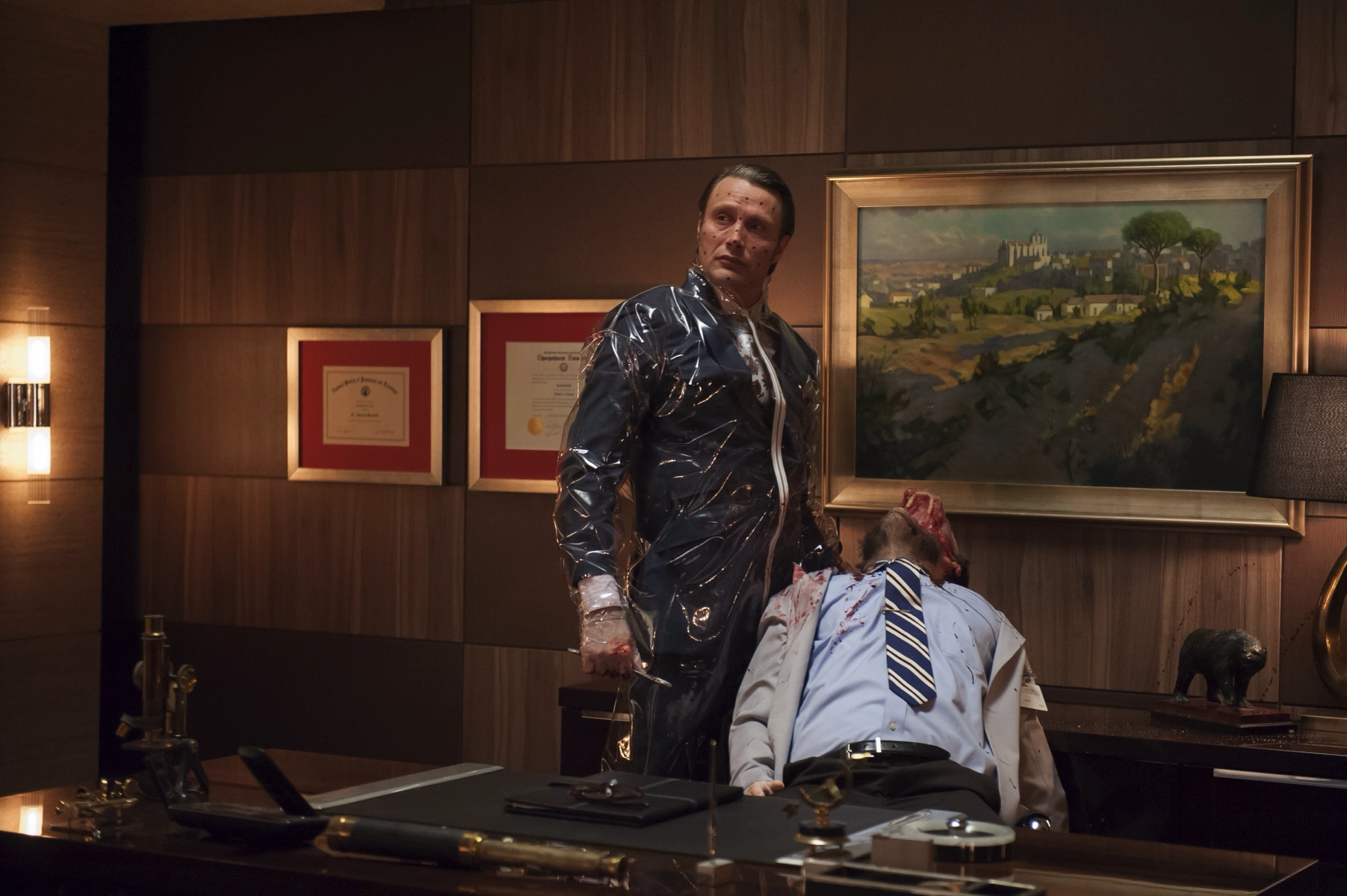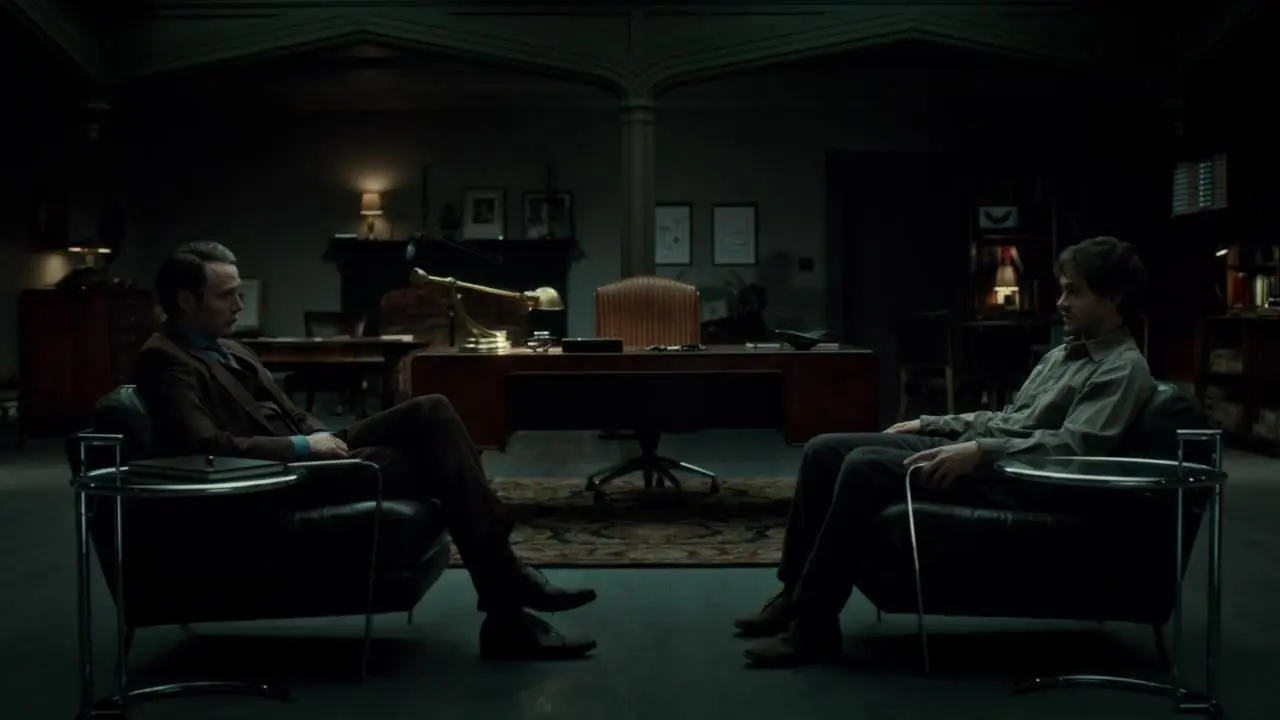HANNIBAL: The Psychology Behind Lecter & Will Graham Exposed

His favorite drink is Chianti. So far, we have seen the actions of this murderer in films like The Silence of the Lambs, Red Dragon, Hannibal, and Hannibal Rising. We had the opportunity to watch a TV series dedicated to Hannibal Lecter too. The creators of the series have explored several interesting themes that did not take center stage in the feature films.
The series Hannibal, created by Bryan Fuller, is about the relationship between two people: Will Graham (Hugh Dancy) and Hannibal Lecter (Mads Mikkelsen). The first is gifted with the extraordinary ability to empathize with murderers and understand their motives. The second needs no introduction—he is an expert at manipulating those around him. These two characters share one trait: they each display a certain type of destructiveness, though it manifests differently for each.

Why do I distinguish between the forms of aggression exhibited by these two characters? The reason is this: they occur on two different levels and have entirely different causes. This is why I refer to Will Graham’s form of destructiveness as psychological, while Hannibal Lecter’s is physical.
There is also a different range of impact. Will Graham’s psychological destructiveness is primarily directed at himself; it is a form of self-destruction that resembles a slow breakdown of personality. This is connected to his ability to empathize with murderers. On the other hand, physical destructiveness is entirely directed at others. It involves manipulation and the killing of people, making it much more expansive and visible. Hannibal Lecter is a skilled murderer and manipulator who needs victims to maintain his identity. He may consume them or control them. In both cases, his destructiveness is more tangible than that of Will Graham.

The Breakdown of the Mind
Will Graham can easily understand the motives of criminals. In the series, this is shown through flashbacks, always accompanied by the words “This is my design,” spoken by Will Graham. There is a significant identification of the character with the murderer here, which is a primary factor in destabilizing Will’s personality.
For any person to function correctly, they must have certain constants in their environment, which they use as a foundation for their actions. These constants are acquired through socialization and participation in culture and relate to the norms of behavior accepted in a given society and personal preferences. Will Graham shows clear deficiencies in socialization. He is a loner living with a group of rescued dogs and does not build lasting relationships with others. He withdraws into himself and his world and is often treated as a tool or a research subject. This is evident in his relationships with Jack Crawford (Lawrence Fishbourne), the FBI Special Agent who offers Will the job, and Hannibal Lecter. The first sees him as a useful instrument for solving criminal cases, while the second quickly makes him a subject of various psychological experiments.

Entering the mind of a murderer adds to Will Graham’s disintegration. He experiences all the emotions the killer felt at the time of the crime, making the words “This is my design” even more terrifying. They can be translated as “This is how I imagined it.” This shows a complete identification with someone entirely alien to Will, meaning that he loses his sense of self to solve the case. In this way, the slow destruction of his psyche progresses. He does not know who he is, loses his sense of self, and his mind fragments rapidly.
Interestingly, Will is fully aware of his problems and sees himself slowly falling apart. By continually assuming different personas, he fuels this disintegration. Dr. Alana Bloom (Caroline Dhavernas), who was once his patient and shares an emotional connection with him, makes attempts to reintegrate his personality. However, all efforts fail, and despite the suffering he endures, Will continues to work for the FBI. He disintegrates further until his personality is entirely shattered.

This process is intensified by two factors. The first is purely physical, involving encephalitis. The second is the way Hannibal Lecter manipulates him, pushing Will to the brink of madness and making him doubt his own identity. The culmination of this process occurs when Will fully identifies with the character of Jacob Hobbes (Vladimir Jon Cubrt), the first psychopath he directly encountered. Hobbes treated people as prey, and Will struggles with guilt, having killed him in front of his own daughter. From that moment on, Will wonders what distinguishes him from the psychopaths he helped catch and suddenly realizes that nothing does. His ability to empathize with their minds becomes a projection of his hidden desires. Through Hannibal Lecter’s manipulations, he begins to believe he is a murderer, that his psychological destructiveness manifests in a direct, physical way. Of course, none of this is true—it all takes place only in Will’s mind. However, it leads to the further disintegration of his self. The moment he accepts himself as a murderer, he loses the last remnants of his constants. Only by understanding who Hannibal Lecter truly is does he regain balance.

Psychological destructiveness is a form of self-destruction. It is a slow breakdown of the self, resulting from the loss of constants in one’s life. A person may be aware of their state but may not attempt to regain balance. Various elements can destabilize them, but balance can only be restored through external action. The subject undergoing personality breakdown must realize their place and exist in a specific point in time and space, in the proper context of events. Otherwise, they will entirely lose themselves in their visions.
The Breakdown of the Body
Hannibal Lecter represents a completely different form of destructiveness. He is a master manipulator and an exceptionally intelligent killer, all hidden under a guise of distance and sophistication. He is a character who easily wins people over and quickly becomes their authority figure. His primary concern is concealing his true identity. He is not a fragmented character; he always behaves like a murderer seeking new victims. However, he inflicts suffering in two ways.

He expertly manipulates the people around him, easily convincing Jack Crawford that Will Graham is a dangerous murderer, arranging all the evidence so that no one can dispute his conclusions. He withholds certain details, such as his knowledge of Will’s encephalitis, and presents him as someone lost in his mind, someone unknowingly killing people. This deception succeeds, and even those closest to Will accuse him of crimes he did not commit.
Dr. Lecter is obsessed with control. He controls everything, makes the right decisions, and events unfold as he presents them. There are no other interpretations. Here, too, his destructiveness is evident. He breaks everything down into components and then helps others create new structures of meaning. He destroys people by taking away their free will, aiming to make everyone dependent on him, and desires to be their ultimate authority. He treats everyone as objects—some are mere pawns, others potential threats. In each group, he seeks victims to satisfy his murderous inclinations. He can do this indirectly (through influence on their choices) or directly (through physical actions, such as violence).

However, his destructiveness is most evident in his killings, which are not marked by aggression. Hannibal Lecter removes specific people, treating killing as a form of humiliation for those who do not behave in a manner that pleases him. He eats them because the only thing he values in them is the taste of their flesh. His actions are fully thought out, with each murder meticulously planned. This planning is evident when Hannibal prepares ingredients for a gourmet dinner, carefully selecting his victims and what he will cut from them. His destructiveness takes on a particular dimension when he builds a totem from human bodies. It becomes clear that killing is more than just a way to acquire meat for dinner; Hannibal’s destructiveness carries a significant meaning. It can be seen as a form of protest against contemporary culture. He shocks people with death because the fear of death is the only emotion that has not faded in human psychology. Every other feeling has been packaged in silver foil and sold. The fear of death retains a mystical dimension and is shared by all. Hannibal’s killings remind people of their mortality, that everything has an end, and that, at some point, there is no way to undo one’s actions.

But it is also a form of manipulation. Hannibal kills and observes how others react to brutal murder, driven by his curiosity. That is why Dr. Lecter reads Tattlecrime, a tabloid about various events related to police investigations, and agrees to cooperate with the FBI. Additionally, he serves different people dishes he has prepared and watches them enjoy the taste without revealing what ingredients were used. Entering the world of law enforcement allows him to understand how the justice system conducts investigations, and his curiosity is most apparent here. He is interested in everything, from the discovered body to the current progress in the investigation.

Physical destructiveness is direct action on the subject, a specific influence aimed at destroying their body. It may be mediated through prior psychological influence, but the completion of the entire destructive process is essential. It is also important to note that it is directed outward, not towards the acting self.
Tension
In the series Hannibal, the investigation itself is not important. The viewer does not deal with a classic crime story where the main goal is to find the murderer. This series is about the tensions that arise between Will Graham and Hannibal Lecter. They are the two most important characters in the entire series, driving the plot and creating twists.

Watching this series feels like observing a psychological experiment. Hannibal Lecter is the scientist conducting the entire study, with the other characters in the show as the participants. The series clearly shows how the complete destruction of the depicted world progresses in the two forms I described. Perhaps balance will only be restored later. However, these are merely my speculations.
Written by Adrian Jaworek

